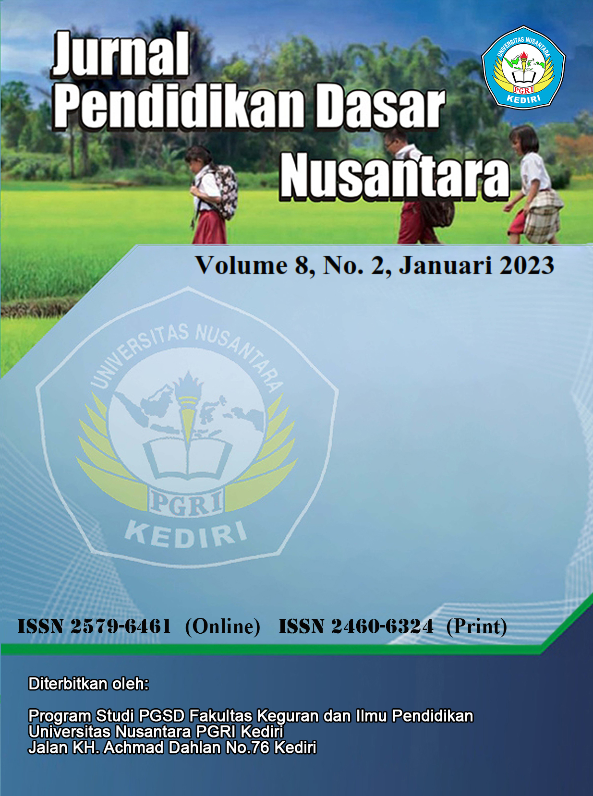Analysis of 2013 curriculum problems so it is changed into a merdeka curriculum
DOI:
https://doi.org/10.29407/jpdn.v8i2.19229Keywords:
Analysis of Curriculum Problems, 2013 Curriculum, Merdeka CurriculumAbstract
The purpose of this study was to analyze what problems occurred in the 2013 curriculum so that it was changed to the merdeka curriculum. This research is included in the qualitative descriptive research using the method narrative inquiry, namely the results of the research which is a detailed description of an event that we make the object of research, without exaggerating the information obtained regarding the analysis of the 2013 curriculum and the difficulties experienced so that it turns to the merdeka curriculum which is currently being discussed and being intensively implemented in schools elementary, starting from class I and class IV. From the results of the analysis, important findings were found, namely that there were 3 aspects of difficulties experienced by teachers in planning learning, carrying out learning and evaluating (learning assessment). So the Merdeka Curriculum was born which is a form of evaluation or refinement of the 2013 Curriculum, and is expected to be able to solve existing problems in the 2013 Curriculum. After going through a trial period of one year it can be said that the Merdeka Curriculum has provided a better picture than the previous Curriculum. Because, the Merdeka Curriculum found fewer problems and was able to solve problems in the 2013 Curriculum.
Downloads
References
Andini, D. W. (2016). DIFFERENTIATED INSTRUCTION”: SOLUSI PEMBELAJARAN DALAM KEBERAGAMAN SISWA DI KELAS INKLUSIF. Trihayu: Jurnal Pendidikan Ke-SD-An, 2(3).
Angga. (2022). Komparasi Implementasi Kurikulum 2013 dan Kurikulum Merdeka di Sekolah Dasar Kabupaten Garut. Jurnal Basicedu, 6(4).
Arofah, E. F. (2021). EVALUASI KURIKULUM PENDIDIKAN. Jurnal Tawadhu, 5(2).
Astri, A. (2021). Analisis Kesulitan Guru Dalam Penerapan Kurikulum 2013 Di Sekolah Dasar. Renjana Pendidikan Dasar, 1(3).
Ayu, N., Lestari, P., Sudarma, K., Ngurah Japa, G., Pgsd, J., & Tp, J. (2016). IMPLEMENTASI MODEL PEMBELAJARAN COURSE REVIEW HORAY UNTUK MENINGKATKAN AKTIVITAS DAN HASIL BELAJAR IPA DI SD. In Journal PGSD Universitas Pendidikan Ganesha Jurusan PGSD (Vol. 4, Issue 1).
Dewi, M. S. A., & Lestari, N. A. P. (2022). THE INFLUENCE OF ACTIVE LEARNING STRATEGIES ON MATHEMATICS LEARNING MOTIVATION OF FIFTH GRADE STUDENTS OF ELEMENTARY SCHOOL (SD) NAKULA CLUSTER, JEMBRANA SUB-DISTRICT. JURNAL PENDIDIKAN DASAR, 8(1).
Febryan, I., Artini, N. P. J., Lestari, N. A. P., & Dharma, I. M. A. (2022). The Need for PowerPoint-Based Cooperative Scripts on the Learning Outcomes of Grade IV Elementary School Students. Mimbar Ilmu, 27(2).
Fitriani. (2019). ANALISIS KESULITAN GURU DALAM IMPLEMENTASI KURIKULUM 2013 PADA SEKOLAH DASAR DI KECAMATAN SUMBAWA TAHUN 2018. Jurnal Kependidikan, 4(1).
Fitriyah, C. Z. (2022). Paradigma Kurikulum Merdeka Bagi Guru Sekolah Dasar. Jurnal Pendidikan Dan Kebudayaan, 12(3).
I. M. A. Dharma, & N. A. P. Lestari. (2022). The Impact of Problem-based Learning Models on Social Studies Learning Outcomes and Critical Thinking Skills for Fifth Grade Elementary School Students. Jurnal Ilmiah Sekolah Dasar, 6(2).
Lestari, N. A. P. (2021). Modul Pendidikan Kewarganegaraan untuk Perguruan Tinggi. Nilacakra.
Lestari, N. A. P., Sri Astika Dewi, M., & Isyarotullatifah. (2021). Pengaruh Implementasi Problem Based Learning Terhadap Motivasi Berprestasi dan Kemampuan Berpikir Kritis Pada Pembelajaran Tematik Terpadu Kelas IV SD Gugus IV Kecamatan Mendoyo. JURNAL PENDIDIKAN DASAR NUSANTARA, 6(2), 52–70. https://doi.org/10.29407/jpdn.v6i2.14669
Maulida, U. (2022). PENGEMBANGAN MODUL AJAR BERBASIS KURIKULUM MERDEKA. Jurnal Pemikiran Dan Pendidikan Islam, 5(2).
Mulyadi, D. (2021). Pelaksanaan Kurikulum Jenjang Pendidikan Tinggi pada Era Revolusi Industri 4.0 Melalui Blended Learning. Inovasi Kurikulum, 18(1).
N. A. P. Lestari. (2022). Pendampingan Bimbingan Belajar di Rumah Siswa SD untuk Meningkatkan Minat Belajar Siswa di Tengah Pandemi Covid-19. JURNAL PENGABDIAN MASYARAKAT INDONESIA, 1(2), 84–91.
N. A., P., & M.S.A. Dewi. (2022). THE EFFECT OF DISCOVERY LEARNING IMPLEMENTATION ON SCIENCE LITERATURE ABILITY REVIEWING FROM SELF REGULATION LEARNING ELEMENTARY SCHOOL STU-DENTS. JURNAL PENDIDIKAN DASAR NUSANTARA, 8(1), 100–113.
Nurhasanah, A. (2021). ANALISIS KURIKULUM 2013. Didaktik : Jurnal Ilmiah PGSD STKIP Subang, 7(2).
Pohan, S. A. (2021). Pelaksanaan Pembelajaran Kurikulum 2013 di Sekolah Dasar. Jurnal Basicedu, 5(3).
Priantini, D. A. M. M. O. (2022). ANALISIS KURIKULUM MERDEKA DAN PLATFORM MERDEKA BELAJAR UNTUK MEWUJUDKAN PENDIDIKAN YANG BERKUALITAS. Jurnal Penjaminan Mutu, 8(2).
Sibagariang, D. (2021). Peran Guru Penggerak Dalam Pendidikan Merdeka Belajar Di Indonesia. Jurnal Dinamika Pendidikan, 14(2).
Syakila, S. N. W. (2022). Kebijakan Program Merdeka Belajar Dalam Penyusunan Rancangan Pelaksanaan Pembelajaran (RPP) Tematik. Buana Pendidikan, 17(2).
Udiyana, K., Lestari, N. A. P., & Dharma, I. M. A. (2022). Pengaruh Implementasi Problem Based Learning Terhadap Hasil Belajar IPA Siswa Kelas IV Gugus Erlangga Kecamatan Mendoyo. INDONESIAN RESEARCH JOURNAL ON EDUCATION, 2(3)
Downloads
Published
Issue
Section
License
Authors who publish with this journal agree to the following terms:
- Copyright on any article is retained by the author(s).
- The author grants the journal, the right of first publication with the work simultaneously licensed under a Creative Commons Attribution License that allows others to share the work with an acknowledgment of the work’s authorship and initial publication in this journal.
- Authors are able to enter into separate, additional contractual arrangements for the non-exclusive distribution of the journal’s published version of the work (e.g., post it to an institutional repository or publish it in a book), with an acknowledgment of its initial publication in this journal.
- Authors are permitted and encouraged to post their work online (e.g., in institutional repositories or on their website) prior to and during the submission process, as it can lead to productive exchanges, as well as earlier and greater citation of published work.
- The article and any associated published material is distributed under the Creative Commons Attribution-ShareAlike 4.0 International License

































